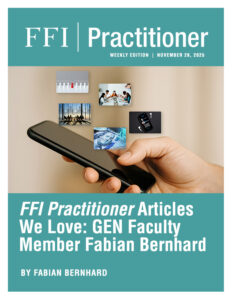
View this edition in our enhanced digital edition format with supporting visual insight and information.
This issue is the fourth in our series of “Articles We Love,” curated by GEN faculty members. This week Fabian Bernhard, GEN 501 faculty member and FFI Fellow, has chosen the articles. He is a full professor of management and psychology at EDHEC Business School in Paris, Lille, Nice, and London.
If you have not participated in the FFI Certificate Program, now might be the time! For more information, go to www.ffigen.org.
Over the past couple of years, I’ve had the pleasure of facilitating GEN 501, a course that explores how academic research can inform professionals working with family enterprises. This topic sits at the core of FFI’s mission to bridge research and practice. In that spirit, I’ve gathered a handful of FFI Practitioner pieces that illustrate that connection, and which also reflect my interest in researching emotional dynamics in family businesses.

The Inherited Bind: How Differentiation of Self and Invisible Loyalties Can Shape Family Businesses’ Succession
by Guillermo Salazar, Ritu Julka, and Maria Milanetti
This article ties very well to my own research and experiences. It finds that stalled successions often arise from two hidden forces: low differentiation of self and invisible loyalties that tie next gens to inherited roles. When these dynamics go unchecked, families face role confusion, emotional fusion or cutoff, and strategic paralysis rather than simple performance gaps. Advisors can learn to create movement by naming unspoken loyalties, fostering psychological safety for disagreement, and coaching toward authentic leadership instead of copying roles. The result is more resilient governance that respects legacy while allowing next gens to lead as themselves.

The Power of Narrative in Family Businesses: A Conversation with Jamie Yuenger and Lisabeth Sugahara
In my research work, I have examined family businesses with troubled histories.1 As it turns out, uncovering and making sense of a family’s past can be cleansing and can foster cohesion. The Practitioner interview with Jamie Yuenger and Lisabeth Sugahara illustrates these dynamics well.

The Manifestations of Money in the Business Family: An Interview with Claudia Astrachan, Anneleen Michiels, and Randy Waesche
This podcast features research-based insights by my academic colleagues Claudia Binz Astrachan and Anneleen Michiels, together with Randy Waesche. They explore how money shows up in business families as incentive, punishment, reward, and control. Beyond transactions, they discuss money’s influence on family dynamics and decision-making, pointing to implications for compensation and governance.

On the Origin of a Successful Successor
By Francesco Barbera
This article by Frank Barbera draws on a study2 that followed next gens’ development over a period of over two years. It maps how next gens move from child to credible leader and explains why early, experience-based development matters as much as “hard” skills. Its practical toolkit on self-reflection, normalizing, emotional awareness, and stronger communication gives advisors concrete steps to help in the development of socially and emotionally competent successors.

Building Resilience in the Shadows of the Past
By Andrew Keyt
Resilience isn’t just built in crisis; it’s forged in the stories families tell about themselves, and especially the ones they leave out. This article introduces the “Successors’ Curse,” where next gens are perpetually measured against prior legends, undermining the credibility and confidence that resilience requires. Drawing on research and practice, the article shows how “differentiation” helps successors step out of the shadows and develop an identity of their own. A vivid case study of Bill Wrigley Jr. captures the turning point from imitation to intentional leadership via a personal strategic plan. Advisors will find practical ways to surface unhelpful myths, reframe family narratives, and equip next gens to grow stronger, steadier, and more effective.
References
1 See our article: Fabian Bernhard and Rania Labaki, “Moral Emotions in Family Businesses: Exploring Vicarious Guilt of the Next Generation,” Family Business Review 34, no. 2 (2021): 193-212, https://doi.org/10.1177/0894486520941944.
2 Francesco Barbera, et al., 2015. “The Relevance of a Whole-Person Learning Approach to Family Business Education: Concepts, Evidence, and Implications,” Academy of Management Learning & Education 14, no. 3 (March 2015): 322-346, https://doi.org/10.5465/amle.2014.0233.
About the Contributor

Fabian Bernhard, PhD, FFI Fellow, is a full professor at EDHEC Business School, as well as a research fellow at the University of Mannheim and at the University of Frankfurt. He is on the review board of Family Business Review and was an FFI board member from 2017 to 2021. He can be reached at fabian.bernhard@edhec.edu.

View this edition in our enhanced digital edition format with supporting visual insight and information.





